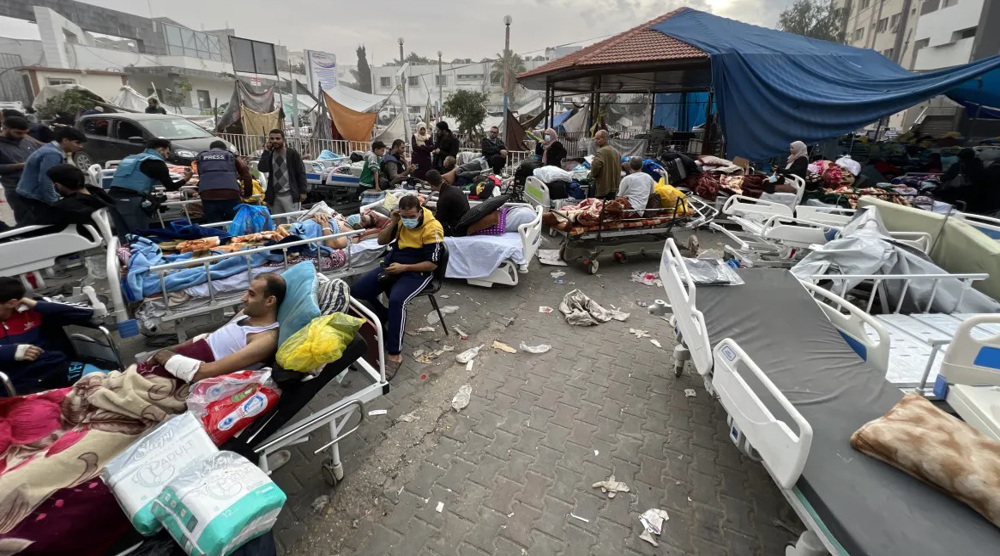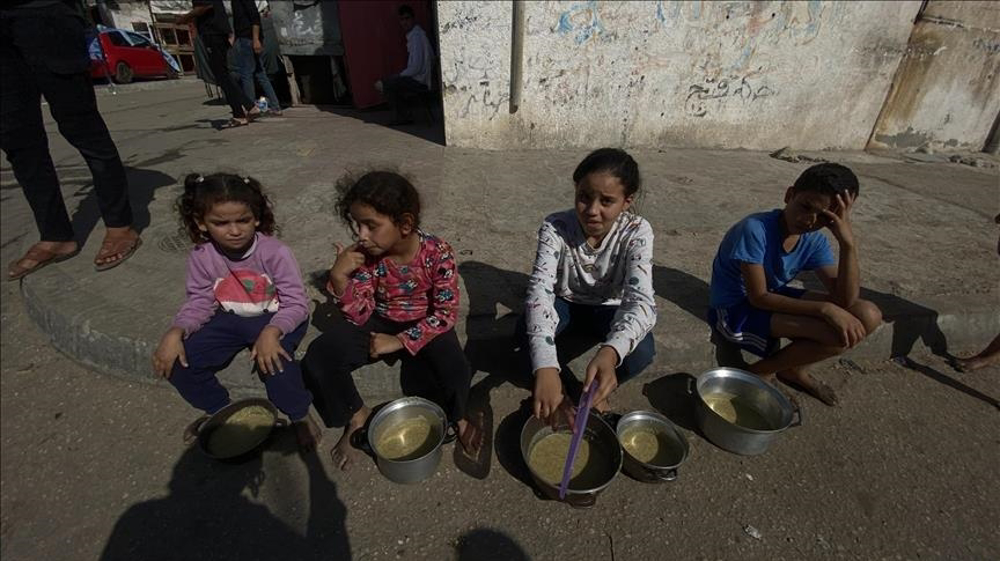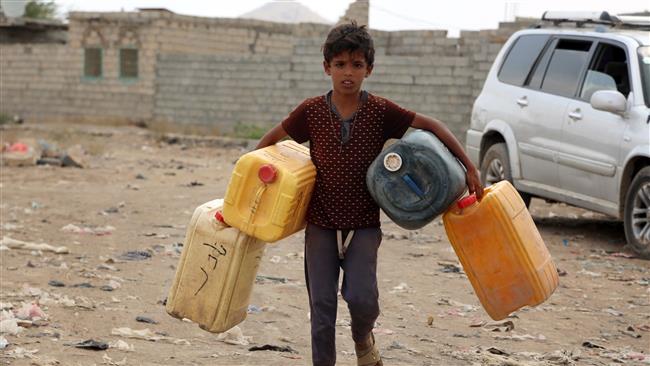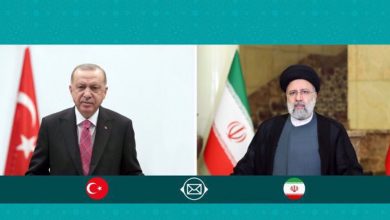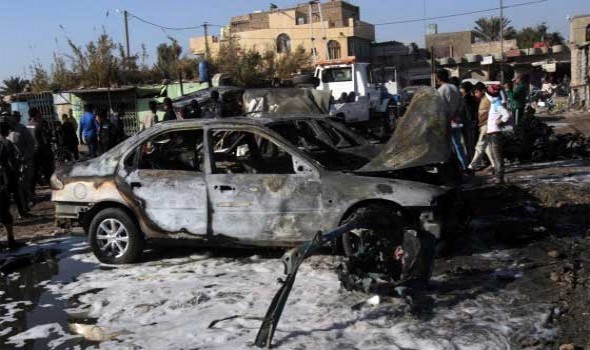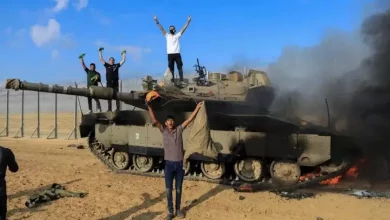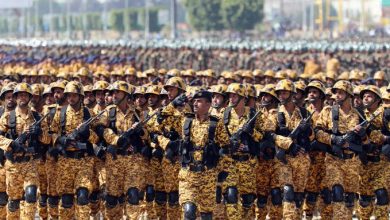Palestinian FM pleads for international protection, says nation faces ‘existential threat’
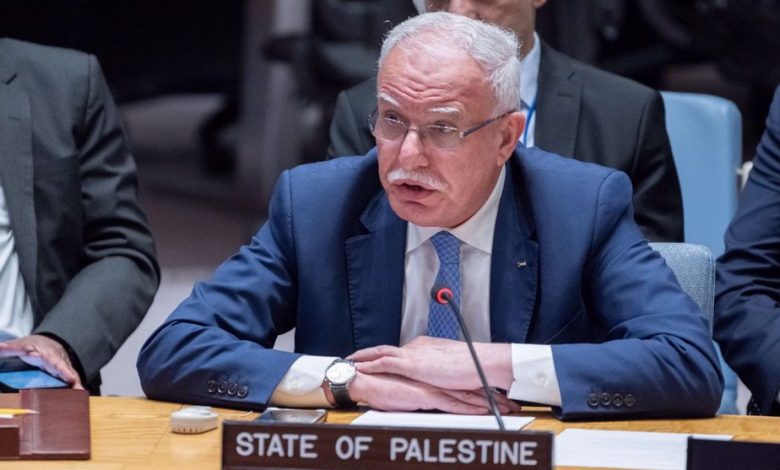
The Palestinian foreign minister has pleaded with the world to provide international protection to the Palestinian people, who “are faced with an existential threat.”
Addressing a UN Security Council meeting on the situation in Gaza, Riyad al-Maliki said Israel does not seek security but wants to eliminate any chance for the creation of a Palestinian state.
“If it was, it would choose peace,” he said, adding that Israel, and this Israeli cabinet specifically considers that the strategic threat it is confronted with is Palestinian statehood.
“Our people are faced with an existential threat. Make no mistake about it. With all the talk about the destruction of Israel, it is Palestine that is facing a plan to destroy it, implemented in broad daylight,” the UN website quoted him as saying.
The protection of Palestinians cannot be ensured by the occupying forces who are complicit in these crimes, he said.
“We need international protection and international action to end impunity so as to prevent the recurrence of these crimes that occur daily and in broad daylight,” he said. “What our people are enduring now is the result of the international community’s failure to provide such protection and accountability.”
He said the world must also put an end to the impunity of the Israeli regime and prosecute it over its war crimes.
Maliki said Israel is trying to intimidate those criticizing it and defending the rule of international law across the globe, including governments that consider themselves allies of Israel, the UN secretary general and UN agencies, human rights, and humanitarian organizations.
‘Massacres cannot be allowed to resume’
He touched on the ongoing Gaza truce, saying it must become a permanent ceasefire to put an end to Israeli atrocities.
“The truce must become a ceasefire, a permanent ceasefire. The massacres cannot be allowed to resume,” Maliki told the council.
“This is not a war,” he said. “This is a carnage that no one can justify. It must be brought to an end.”
“Over 15,000 Palestinians have been killed by Israel. Over 10,000 of them are women and children. They have been killed by Israel. They did not lose their life; it was taken away. No one is safe in Gaza, not the children, not the doctors, not the humanitarian personnel, not the journalists, not the UN staff. They were killed at an unprecedented pace in modern history,” he said.
“Gaza has a very special place in our national history,” he said. “Its name today is how many people spell Palestine around the world. It cannot be erased. Our people cannot be uprooted from it. Its Palestinianness cannot be altered. There is no Palestine without Gaza. Gaza bleeds, Gaza suffers, Gaza aches, but Gaza lives. And Palestine lives. Free Palestine. That is the only path to peace.”
He said the siege on Gaza must also be ended and the people of the coastal strip must be allowed to return to their homes.
West showing double standards: Russia
Vassily Nebenzia, the Russian ambassador to the UN, stated that the conflict has become one of the most lethal regional conflicts in recent decades.
He questioned the “blatant double standards” of Western delegations vis-à-vis the Palestinian people.
“How many times have Western delegations requested Security Council meetings on Ukraine? The answer is at least twice a month,” he said, adding, “How many times have these delegations requested Security Council meetings on the Middle East? Zero.”
“Why are you being so timid, or is it that the fate of the Palestinian population is much less interesting for you from a domestic political perspective in your capitals?” he charged.
The Russian ambassador went on note that it is also time to think about the days after the end of the war.
“There are many questions about the ways to rebuild Gaza and in general the future long-term solution to the Palestinian question,” he said, adding that “without a solution to that, it will not be possible to ensure a truly sustainable security situation for Israel.”
Moreover, China’s Foreign Minister Wang Yi told the meeting that resumed fighting will most likely turn into a “calamity that encompasses the whole region,” expressing hope that the pause will be the beginning of a negotiated ceasefire.
Civilians must be protected with more robust actions, and the UN must play a greater role in humanitarian efforts in Gaza, he said.
The Security Council should shoulder its responsibility and heed the calls to take further action promptly, he said, adding that China has submitted a paper on resolving the conflict.
The UAE’s Minister of State Khalifa Shaheen said the current truce is “a sign of hope,” and stressed that it was vital to improve aid mechanisms “in a sustained manner and at sufficient scale.”
He said recent events have demonstrated the need to work to revive hope for the possibility of reaching a just, lasting, and comprehensive political solution to the Palestinian issue.
Qatar’s Prime Minister Sheikh Mohammed bin Abdulrahman Al Thani told the meeting that international law should be applied “without double standards and without preferential treatment.”
“The double standards applied by the international community regarding the carnages and the crimes perpetrated by the Israeli occupation against civilians and civilian infrastructure … [are] a stain on the conscience of humanity,” he said.
He said Qatar is eager to see the Council take steps towards applying a “sustainable ceasefire,” and implementing measures to guarantee the flow of “sufficient humanitarian aid and to secure the delivery thereof without any impediments.”
Ayman Safadi, the Jordanian foreign minister, underscored that ending the Israeli occupation of Palestine is the only viable way to ensure peace for Palestinians, Israelis, and all others in the region.
“Those who purport to say that this conflict is a religious conflict are lying. They are trying to falsify history and reality,” he said, stressing that the conflict continues because of an “unfair occupation and flagrant injustice.”
He urged the Security Council to make a strong call for a ceasefire and to bring an end to the aggression.
Gaza faces ‘epic’ humanitarian crisis
Earlier, UN Secretary General Antonio Guterres told the meeting that the Gaza Strip was in the midst of an “epic humanitarian catastrophe”, urging the world not to look away.
“Intense negotiations are taking place to prolong the truce – which we strongly welcome – but we believe we need a true humanitarian ceasefire,” he said.
The United Nations has scaled up the delivery of humanitarian aid to Gaza – a coastal territory of 2.3 million people – during the truce, but Guterres said the level of aid “remains completely inadequate to meet the huge needs.”
“The people of Gaza are in the midst of an epic humanitarian catastrophe before the eyes of the world,” he said. “We must not look away.”
Guterres said “nowhere is safe” in Gaza, and noted that 80 percent of its residents have been forced from their homes.
“In a matter of weeks, a far greater number of children have been killed by [the] Israeli military operations in Gaza than the total number of children killed in any year by any party to a conflict since I’ve been secretary-general,” Guterres continues.
“It is with immense sadness and pain that I report that since the beginning of the hostilities, 111 members of our UN family have been killed in Gaza. This represents the largest loss of personnel in the history of our organization,” Guterres said.
“Meanwhile, an estimated 45 percent of all homes in Gaza have been damaged or destroyed,” Guterres said, adding that the scale of death and destruction is “characteristic of the use of wide-area explosive weapons in populated areas.”
The ongoing truce in the latest conflict between Israel and Hamas was scheduled to expire early Thursday after a six-day pause in the fighting, which has seen 60 Israeli captives and 180 Palestinian prisoners released.
The truce has brought a temporary halt to the Israeli war on Gaza, which started on October 7 after Hamas’s surprise operation that caught the regime flat-footed.
Israel’s air and ground campaign in Gaza has killed over 15,000 people, mostly civilians, and reduced large parts of the north of the territory to rubble.
